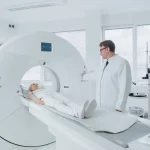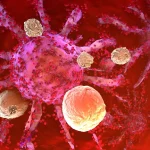Types of medication or immunotherapy treatments in oncology
Treatments
- Alpha interferon (Intron-A, Wellferon)
Interferon is a cytokine secreted by the body. Alpha interferon is manufactured in a laboratory and can be used to treat cancers, among them therapy-resistant chronic myeloid leukemia (CML) and melanoma. It is also used in people who cannot tolerate other treatments. With the discovery of other immunotherapy treatments in oncology, alpha interferon is now practically never used in cases of melanoma.
- Interleukin-2 (Proleukin)
Interleukin is another type of cytokine secreted by the body which is also manufactured in a laboratory setting. It is sometimes administered intravenously to treat advanced kidney cancer or given by intralesional administration (directly into the tumor) when treating certain advanced melanomas that generate lesions on the skin or in the subcutaneous tissue.
- Intravesical therapy for bladder cancer (Bacillus Calmette-Guérin or BCG)
BCG is a bacteria transformed in the laboratory to ensure that it cannot trigger any disease. Its use results in a bladder inflammation that triggers the immune system to attack and destroy cancer cells. This therapy is administered inside the bladder (intravesical) at regular intervals to address certain superficial bladder cancers.
- Checkpoint inhibitor therapies
Checkpoint inhibitor therapies are the medications most often used in cancer immunotherapy. When required, the immune system can destroy viruses, bacteria and cells (like cancer cells), but it must first determine whether a cell is foreign (virus or bacteria), abnormal (precancer or cancer) or normal; this is done through a surveillance process ensured by immune checkpoints that stop the immune system from erroneously setting its sights on healthy normal cells. Unfortunately, cancer cells have the ability to trick the immune system by deactivating immune cells, particularly T lymphocytes.
Checkpoint inhibitors are medications that successfully target specific checkpoints and stop them from working. In other words, they prevent these checkpoints from blocking certain actions, which promotes a heightened immune response of the body against cancer cells.
The medications used as checkpoint inhibitor therapy are monoclonal antibodies. Developed in a laboratory setting, they are variants of immune system proteins called antibodies. The manner in which these medications act on immune checkpoints is a fine example of cutting-edge technology in the realm of immunotherapy in oncology.
The checkpoint inhibitor therapies most commonly used are:
- anti-CTLA-4 therapies, which block the CTLA-4 protein that prevents the immune system’s activation;
- anti-PD-1 (or anti-programmed cell death protein 1), which block the PD-1 protein, an immune checkpoint that prevents T lymphocytes from attacking other cells;
- anti-PD-L1 (or anti-programmed cell death ligand 1), which blocks the ligand (a link on a cell) to which the PD-1 protein attaches. Anti-PD-1 and anti-PD-L1 therapies strengthen the attack and destruction of cancer cells.
They are used to treat, among other things, melanoma, lung cancer, kidney cancer, Hodgkin’s lymphoma, bladder cancer, liver cancer, epidermoid cancer and some head and neck cancers. These will be described in greater detail in the sections on the primary cancers treated by immunotherapy. Clinical trials are also underway on the use of these medications to treat other cancers.
Main medications available:
- Nivolumab (Opdivo) (anti-PD-1)
- Pembrolizumab (Keytruda) (anti-PD-1)
- Atezolizumab (Tecentriq) (anti-PD-L1)
- Durvalumab (Imfinzi) (anti-PD-L1)
- Avelumab (Bavencio) (anti-PD-L1)
- Ipilimumab (Yervoy) (anti-CTLA-4)
- Cemiplimab (Libtayo) (anti-PD-L1)
This type of immunotherapy, based on checkpoint inhibitors, greatly reduces the body’s natural defenses that prevent an exaggerated activation of the immune system. This creates the risk that normal cells will be affected and autoimmune responses triggered. The possible side effects are thus distinct from those resulting from chemotherapy and require stricter clinical monitoring.
- Bispecific antibodies
Consisting of both immunotherapy and targeted therapy, bispecific antibodies activate the immune system so that it can destroy cancer cells. These antibodies are deemed “bispecific” because they can bind to two different types of cells: cancer cells and T lymphocytes, which are immune cells. The antibodies, by fostering the linking of these two types of cells, make it easier for T lymphocytes to eradicate cancer cells. At the time this document was drafted, only one medication in this category had been approved: Blinatumomab (Blincyto) (monoclonal antibody anti-CD-19/3), used to treat cases of acute lymphoblastic leukemia (ALL) referred to as relapsed (returning) or unresponsive (that does not respond well to other treatments). Several other molecules are currently being tested in clinical trials.
- Cellular therapy: adoptive transfer of cells or CAR T-cell therapy
This innovative and continually evolving treatment revolves around T lymphocytes, which are a type of white blood cell and a main component of the immune system. T lymphocytes fight infections and seek to eliminate abnormal cells, including cancer cells.
T lymphocytes are first obtained from the patient’s blood, then transformed in the laboratory by binding chimeric antigen receptors (CAR) to their surface. These receptors enable the modified cells, called CAR T-cells, to detect the specific antigen (protein) expressed by the cancer to be treated. Once modified, these cells are grown in a laboratory until they multiply into the millions. They are then readministered intravenously so that they can continue to grow and, through their receptors, detect, attack and destroy cancer cells.
Since 2019, CAR T-cell therapy is offered in Québec to treat acute lymphoblastic leukemia (ALL) in children and young adults, as well as unresponsive diffuse large B cell non-Hodgkin’s lymphoma (NHL) in adults.
Numerous clinical trials are also underway to develop other therapies using this identical technique to eventually treat other types of cancers.
- Therapeutic vaccination against cancer
Many major research projects are currently investigating this specific type of therapy. To date, only one therapeutic vaccine, Provenge3, has been authorized in the United States as a treatment for advanced prostatic cancer. Provenge3 was not yet available in Canada at the time of writing this document.
When we consider the matter of vaccination, we usually think of a preventive measure to protect people from disease or infection (e.g., the flu). In oncology, the HPV vaccine offers protection against cervical cancer and other cancers linked to the human papillomavirus. Oncology research also focuses on developing vaccines to treat cancer. Such therapeutic vaccines do not seek to prevent cancers, as do preventive vaccines, but are produced as a treatment option for existing cancers.
The objective of this therapy is to stimulate the immune system so that it focuses specifically on cancer cells. Its goals are to:
- prepare the immune system to detect cancer cells;
- increase the number of immune cells able to detect cancer cells;
- stimulate immune cells so that they can eliminate cancer cells;
- prevent the recurrence of cancer.
Various types of therapeutic vaccines are currently being developed or undergoing clinical trials. Depending on the type of cancer targeted, these vaccines can be developed from different materials, for example, cancer cells, cell fragments, antigens or even immune cells. These vaccines must have the ability to provoke an immune response as faithfully and efficiently as possible so as to counter the tricks used by cancer cells to defy the body’s immune system.

































